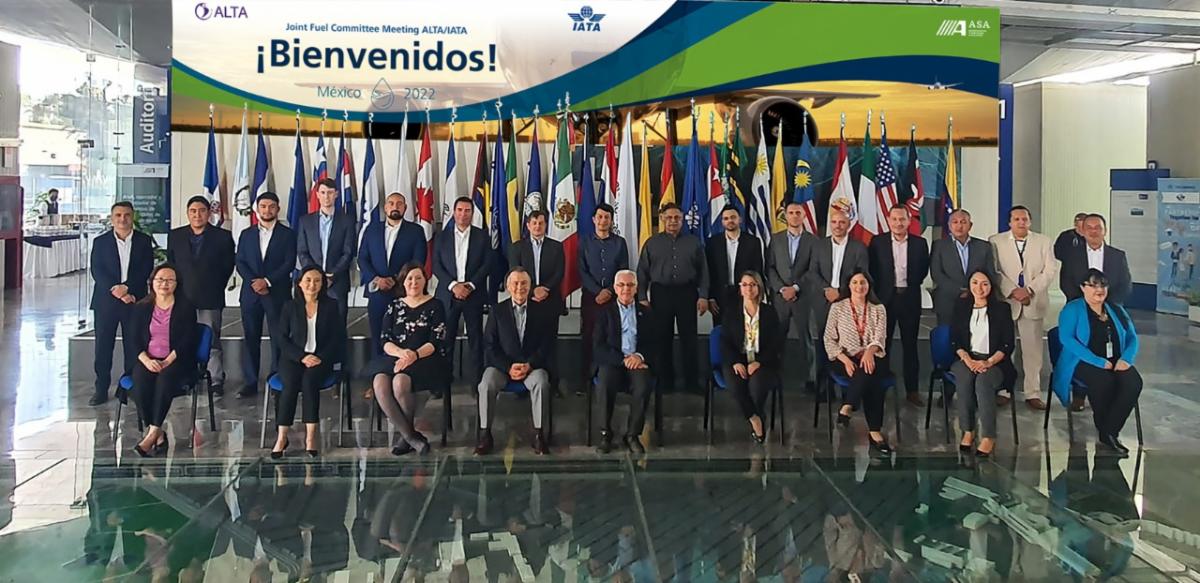Source: ALTA
- Executives from the aviation fuel division gathered in Mexico City
Executives from 13 airlines and 16 aviation fuel suppliers attended the joint in-person meeting of the Latin American and Caribbean Air Transport Association (ALTA) Fuel Committee and the International Air Transport Association (IATA) Americas Regional Fuel Working Group on February 22, 23 and 24 in Mexico City.
The first day of the meeting took place at the International Training Center of Aeropuertos y Servicios Auxiliares (CIIASA) and included a dedicated agenda for airline representatives to discuss about the Mexican market, with presentations by Oscar Arguello, General Director of ASA, and Mauricio Arellano, Director of Fuels of ASA, as well as discussions on campaigns and priorities in the region, especially in Brazil, Costa Rica, Colombia, Peru, Ecuador, Uruguay and Argentina, regulatory updates on sustainable aviation fuels, fees and fuel price transparency in the region, with presentations by Jaime Escobar, Director of Fuels and Charges of ALTA, Daniel Cherau, Deputy Director of Fuels of IATA, and Pedro de la Fuente, External Relations and Sustainability Manager of IATA.
The second day included the participation of suppliers and an agenda focused on the current scenario of the energy market, infrastructure campaigns, fees, transparency and supply, the role of sustainable aviation fuels (SAF) to achieve zero emissions, the production, distribution and supply of SAF in the region and the experience in supply, with presentations by Ellie Valencia Manager, US Distillates and Latin Refined Products Pricing of S&P Global Platts and Stephanie Zhu, General Manager of Sustainability of Delta Air Lines.
Jaime Escobar, Director of Fuels and Charges of ALTA, noted that “we are very pleased with the large attendance at this face-to-face meeting that reinforces communication and knowledge on a key issue for the aviation industry, which has challenges in the region, but a great opportunity to generate changes for a more efficient and environmentally responsible operation. The level of the discussions, the exchange of knowledge and the work plan set represent a very high value and an important step towards the goal of achieving zero net emissions by 2050. ALTA thanks all participants and ASA / CIIASA, an ALTA affiliate member, for its hospitality and the visit to its training facilities and fuel plant at the Felipe Angeles International Airport within the joint effort to strengthen abilities in training and professional development and recovery of the industry.”
José Ricardo Botelho, ALTA’s Executive Director and CEO commented “ALTA’s Fuel Committee keeps growing on a daily basis, demonstrating that each new ALTA member brings value and professional experiences to strengthen the entire aviation value chain in the region. On October 15, 2021, ALTA member airlines unanimously approved a resolution to work together towards the common goal of achieving zero net carbon emissions by 2050. Since then, ALTA has redoubled its efforts to support its members in this mission and this event represents one more step in the work plan towards this common goal. I thank everyone who made this meeting possible and for their contributions to achieve together a more efficient, safer and environmentally responsible aviation.”
The meeting had the participation of representatives from Aeroméxico, Aeromar, Volaris, Viva Aerobus, American Airlines, LATAM Airlines, Atlas Air, Delta Air Lines, Avianca, Viva, Air Canada, Copa Airlines, Wingo and Aerunión; as well as fuel suppliers as: AEG Fuels, ASA, ASM, Argus, AVFuel, BETA Fueling, CEPSA, Chevron, Exolum, Neste, Puma, QT Technologies, SP Global Platts, Terpel, Valero and World Fuel Services.
Special thanks to ASA, Aeromexico, AEG Fuels, Argis, Terpel, Valero and World Fuel Services for their support in making this event possible.
ALTA’s Fuel Committee works closely with airport operators, aviation fuel suppliers, governments and airlines to promote actions to ensure that aviation fuel fees and charges are aligned with best commercial practices and meet international aviation industry policies established by the International Civil Aviation Organization (ICAO), so that airlines and suppliers determine priorities and work standards in search of efficiencies and best practices in the supply of fuel with quality, safety, transparency and efficiency.

